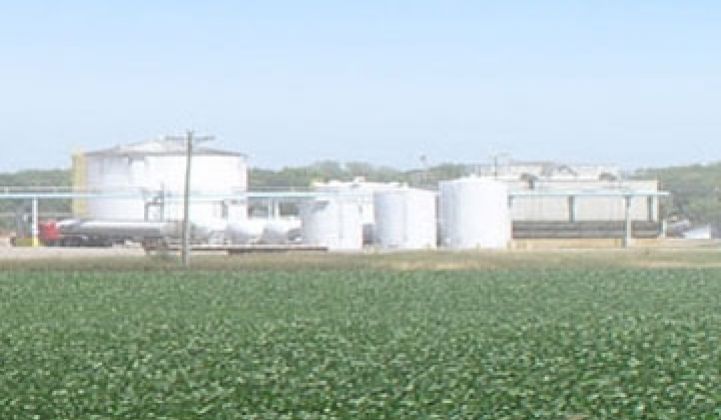Segetis wants to make mixed biomass into a hitherto unknown chemical, and turn it into a variety of industrial chemicals. That could give it an entrée to the trillion-dollar global chemical market, if it can scale up to the task.
Thanks to a $15 million investment from Khosla Ventures, doled out in $5 million per year increments starting in 2007, the two-year-old startup has started making its new chemical – levulinic ketal – at a 300,000 pound-per-year test plant that opened in January, CEO Jim Stoppert said Wednesday.
Now the Golden Valley, Minn.-based startup is looking for $15 million to $20 million more in new financing, Stoppert said Wednesday at the AlwaysOn GoingGreen conference in Sausalito. That will help it continue developing its technology over the next year and a half, as well as set it on a course to raise financing to build a $20 million plant that could make up to 100 million pounds per year of its new chemical, he said.
Segetis has come up with a way to turn various forms of biomass – palm fronds, bagasse, wood pulp, corn stover, or even mixed municipal waste – into levulinic acid. It has also devised a process to make that acid into levulinic ketal, he explained.
Levulinic ketal, in turn, can be made into a variety of different chemicals – most of which are now derived from oil and natural gas – that include plasticizers, emulsifiers, VOC-free solvents and other such basic chemicals.
That's a similar tack being taken by San Diego-based Genomatica, which makes industrial chemicals MEK and BDO using sugar and genetically engineered microbes, or OPX Biotechnologies, which makes microbes that turn sugar or syngas into bioacrylic (see Genomatica: Microbe-Made-Chemicals Could Save Empty Ethanol Plants and OPX Lands $17.5M for Bioacrylic, Biodiesel).
It's also what South San Francisco startup LS9 has said it will do in partnership with consumer products giant Procter and Gamble, as it also seeks to create biofuel with its microbes (see LS9, Procter and Gamble Ink Biochemicals Partnership).
But Stoppert – a former executive with Dow, Cargill and NatureWorks who joined Segetis in September 2008 – said the company's process, which is thermochemical rather than biological in nature, may offer less technology risk.
Stoppert said Segetis's chemicals can be cost-competitive with oil at $50 a barrel. The company is already supplying about 15 customers with test amounts of levulinic ketal, he said, though he wouldn't name them.
But some markets may open up faster, he said. Take plasticizers, the chemicals that make hard PVC soft enough to be used in toys and other flexible purposes. Right now the main chemical used for that are phthalates, which are under attack for their toxicity, he said.
Segetis hopes to close its next funding round in October, and have its large-scale plant up and running by 2012, Stoppert said.
Learn how to differentiate your company through greener product lines at Greening the Supply Chain on September 17 in Boston.




